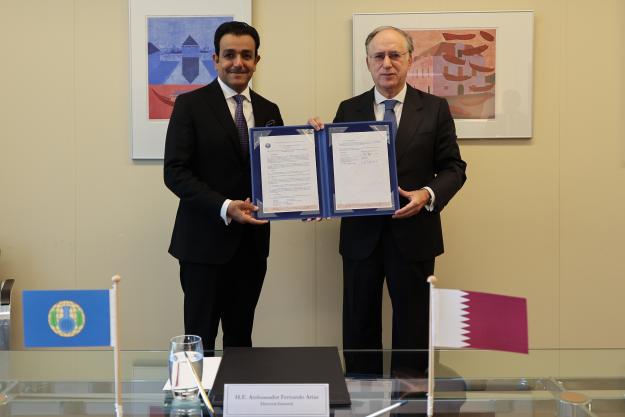The Organisation for the Prohibition of Chemical Weapons (OPCW), in cooperation with the National Committee for the Prohibition of Weapons (NCPW) of the State of Qatar, held the Eleventh Annual Meeting of Representatives of the Chemical Industry and National Authorities of States Parties to the Chemical Weapons Convention (CWC) from 15 to 17 October 2024 in Doha, Qatar.
The three-day meeting enhanced dialogue and understanding by sharing pertinent updates on, among others, Article VI verification, policy and strategy related developments, the activities of the International Council of Chemical Associations (ICCA), and the international Chemical Trade Association (ICTA) over the past year. It fostered dialogue on a range of topics to improve chemical industry declarations, enhance vigilance on emerging technologies including AI, and link up chemical security legislation with the Responsible Care/Distribution initiative of the ICCA and ICTA.
In his opening speech, the Chairperson of NCPW, Brigadier General Dr Abdulaziz Salmeen al-Jabri, underscored the importance of the meeting and thanked the Technical Secretariat of the OPCW for trusting Qatar with hosting of this vitally important annual gathering. He indicated that the meeting was expected to provide insightful recommendations that will promote the partnership of National Authorities and chemical industries in attendance.
Fifty-four participants from 27 Member States participated in the event. The Annual Meeting benefited from the expertise of the participating Member States, the OPCW Technical Secretariat, and experts from various organisations, including the NCPW, ICCA, and ICTA. These experts provided valuable updates on activities and crucial technical insights from their professional backgrounds to the discussions.

H.E. Dr. Mutlaq bin Majid Al Qahtani, Ambassador and Permanent Representative of the State of Qatar to the OPCW, and Ambassador Fernando Arias, Director-General of the OPCW
The Annual Meeting is hosted and funded by Qatar every year. This year's contribution was formalised on 11 October 2024 in a signing ceremony held between senior Qatari officials including H.E. Dr. Mutlaq bin Majid Al Qahtani, Ambassador and Permanent Representative of the State of Qatar to the OPCW; H.E. Dr. Abdulaziz Salmeen al-Jabri, and Ambassador Fernando Arias, Director-General of the OPCW, at the OPCW's Headquarters in The Hague.
In the signing ceremony, Director-General Arias expressed his deep appreciation to Qatar for its continuous contribution to this important event. He underlined the key stakeholder roles that the chemical industry and National Authorities have played in the effective implementation of the Convention. "The global chemical industry is expanding in size and sophistication. Deepening the collaboration between the chemical industry and National Authorities will be highly conducive to the fulfilment of the obligations under Article VI of the Convention."
The Director-General stated that "The Third Special Session of the Conference of the States Parties encouraged the Technical Secretariat to continue strengthening its relations with regional and international chemical industry associations. The OPCW is determined to promote the engagement between national regulatory bodies and chemical industrial sectors. Activities such as this Annual Meeting help to develop more efficient working practices and ensure the capacity building efforts of the OPCW are result oriented."
Background
Qatar has been an active member of the OPCW since the Chemical Weapons Convention entered into force in 1997. Qatar is a member of the Executive Council, the OPCW's executive organ, which is responsible for promoting the effective implementation of and compliance with the Chemical Weapons Convention as well as supervising the activities of the Organisation's Technical Secretariat.
To date, the State of Qatar has supported diverse OPCW projects and activities, including the OPCW Centre for Chemistry and Technology. Since 2022, Qatar has contributed a total of € 596,384 to a series of trust funds of the OPCW.
The Annual Meeting provides an opportunity for National Authorities and the chemical industry to enhance their coordination and collaboration in effectively implementing the CWC, and how they can collaborate to achieve these goals. It has raised awareness of the Convention's obligations and enhanced capacities of the States Parties to implement relevant provisions in a timely and effective manner.
As the implementing body for the Chemical Weapons Convention, the OPCW, with its 193 Member States, oversees the global endeavour to permanently eliminate chemical weapons. Since the Convention's entry into force in 1997, it is the most successful disarmament treaty eliminating an entire class of weapons of mass destruction.
On 7 July 2023, the OPCW verified that all chemical weapons stockpiles declared by the 193 States Parties to the Chemical Weapons Convention since 1997 - totalling 72,304 metric tonnes of chemical agents - have been irreversibly destroyed under the OPCW's strict verification regime.
For its extensive efforts in eliminating chemical weapons, the OPCW received the 2013 Nobel Peace Prize.






